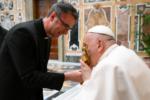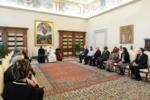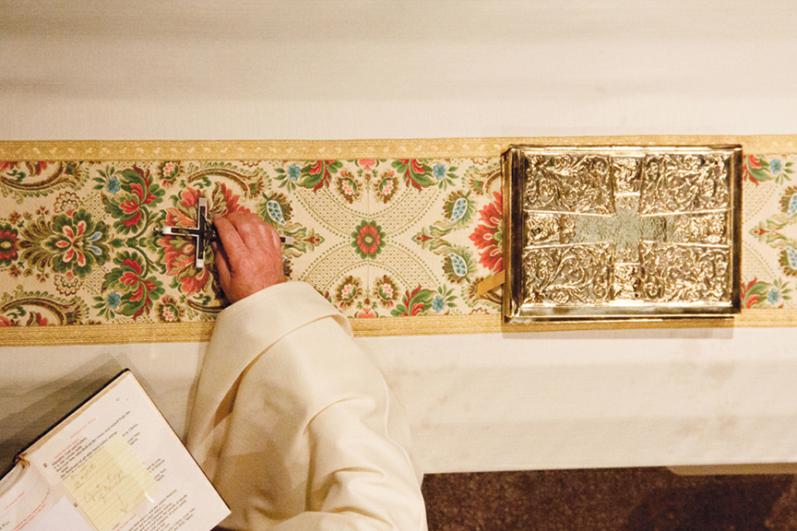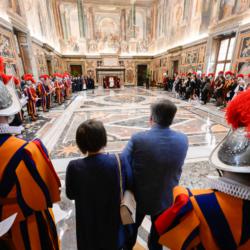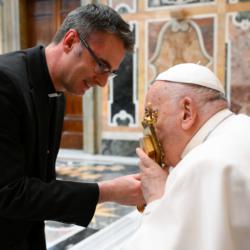'Eternal rest grant unto them, O Lord'
As we continue our visit to the liturgical library, this week, we pick up "Order of Christian Funerals." The new title is important as this means that this book contains several chapters that are actually different "rites" or ways the funeral of a Catholic might be celebrated.
This book reveals that Christian burial is a "stational" liturgy celebrated, preferably, at three places with movement from one place to the other. It also contains texts for occasions outside the preferred vigil -- Mass -- burial. These are prayers at the time of death and The Office of the Dead, among others. It also contains a wide variety of prayers for particular situations of death, e.g., the death of one who suffered or who died suddenly, the death of a young person, death by suicide, the death of a child, the death of a religious, etc.
As was mentioned, the usual form is the vigil -- Mass -- burial. We'll look at each in more detail.
The vigil, or as it is more commonly called, the wake or calling hours, is a time for the family to receive other relatives and friends, usually at a funeral home, but this could also be in a church. There is a prayer service. Usually, a priest from the parish where the Mass will be celebrated directs this service with the family and those in attendance. It is possible for a deacon or lay person (perhaps a member of a parish bereavement team who has assisted the family in the preparation of the various services) to celebrate this vigil. This is also the ideal time to have a "Celebration of Life" service and to share memories of the deceased.
Then, there is the Funeral Mass or the Mass of Christian Burial, as this Mass is properly called (either is fine). The Funeral Mass is not a celebration of the life of the deceased, nor is it a "Mass of the Resurrection" -- that's on Easter Sunday. There is a substantial selection from which the readings and responsorial Psalm may be chosen. Other texts -- religious or otherwise -- may not replace the Word of God. Additionally, it is the clear preference of the church that the readings from the ''Order of Christian Funerals'' be the source of readings for the Funeral Mass.
The music for the Funeral Mass is to be liturgical and not secular. The vigil service would be a great place to have special "favorites" of the deceased played.
The bishop, priest, or deacon delivers a homily based on the sacred texts. The homily is not a eulogy. A eulogy might better be delivered by a family member at the vigil in the church or funeral home. As with a Sunday homily, it should be, as Pope Francis advises, about seven or eight minutes.
The Mass continues as usual, incorporating special prayers at appropriate times, including a mention of the deceased in the commemoration of the dead in the Eucharistic Prayer. The Mass concludes with the Final Commendation and usually proceeds to the place of burial.
There is a note that a member of the family might deliver words of remembrance. These "words" are to be brief; five minutes would seem to be best. There is to be only one. Again, this would be better delivered at the vigil, where others could also share memories.
The last station is at the place of committal. Here is the brief prayer service committing the mortal remains of this Catholic Christian to a final resting place -- in the sure and certain hope of the resurrection from the dead. While most often, the priest celebrant of the Funeral Mass would lead these prayers, it is also possible, as with the vigil, for a deacon or layperson to celebrate this "station" at the place of committal.
The above is the preferred but not the only way a Catholic funeral might be celebrated. For example, there might be no vigil, but a Mass and committal would be celebrated. Or there might be all three stations, but there would be a Liturgy of Word, in which case a deacon or layperson could lead the services.
It is important to recall that with all the choices permitted for a funeral, this is a Roman Catholic funeral, and this means the "choices" are not without limits. A Roman Catholic funeral is a celebration, not of the deceased, but of the action of God's grace in this particular person's life and of the victory of life Christ has won for us by his own death and resurrection.

